Understanding Food Allergies: How Duoflora Helps Build Tolerance
What Is Food Allergy?
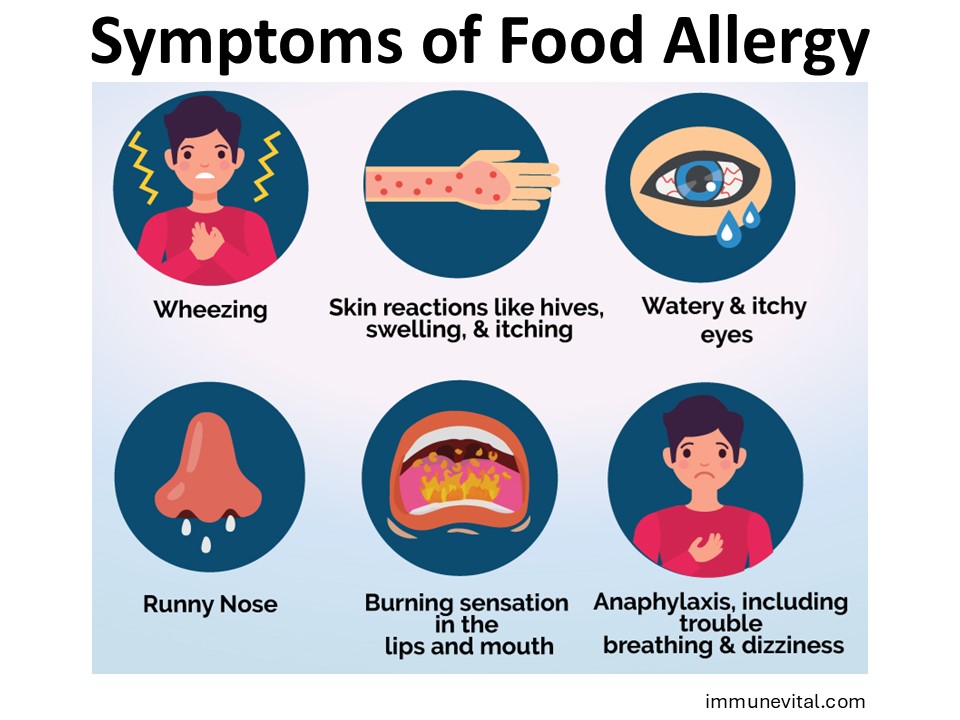
Imagine sitting at a family dinner, watching everyone enjoy their favorite dishes.
While you quietly scan every ingredient on your plate.
For people with food allergies, even a tiny trace of the wrong food can trigger anything from mild itching to shortness of breath.
Unlike food intolerances (uncomfortable but not dangerous), food allergies are an immune overreaction that can be life threatening.
Here’s a startling fact: food allergies are on the rise, affecting millions worldwide.
For families with food allergies, it changes how they shop, cook, and socialize.
The Hidden Burden of Food Allergies

Food allergies don’t just limit meals—they reshape family life:
Constant Worry: Sending kids to school lunches or birthday parties becomes a gamble.
Social Strain: Adults may skip dinners or buffets to avoid cross-contamination.
Emotional Toll: Hyper-vigilance around food can lead to stress and anxiety.
Why Your Gut Holds the Key

Over 70% of your immune cells live in your gut. A balanced gut microbiome teaches your immune system what’s safe (food) and what’s harmful (pathogens). When that balance is lost—dysbiosis—your immune system can misidentify harmless foods as threats, driving allergy development.
Good news: Restoring gut balance can help your immunity build tolerance—and even outgrow allergies.
Meet Duoflora: The Probiotic That Delivers Real Results
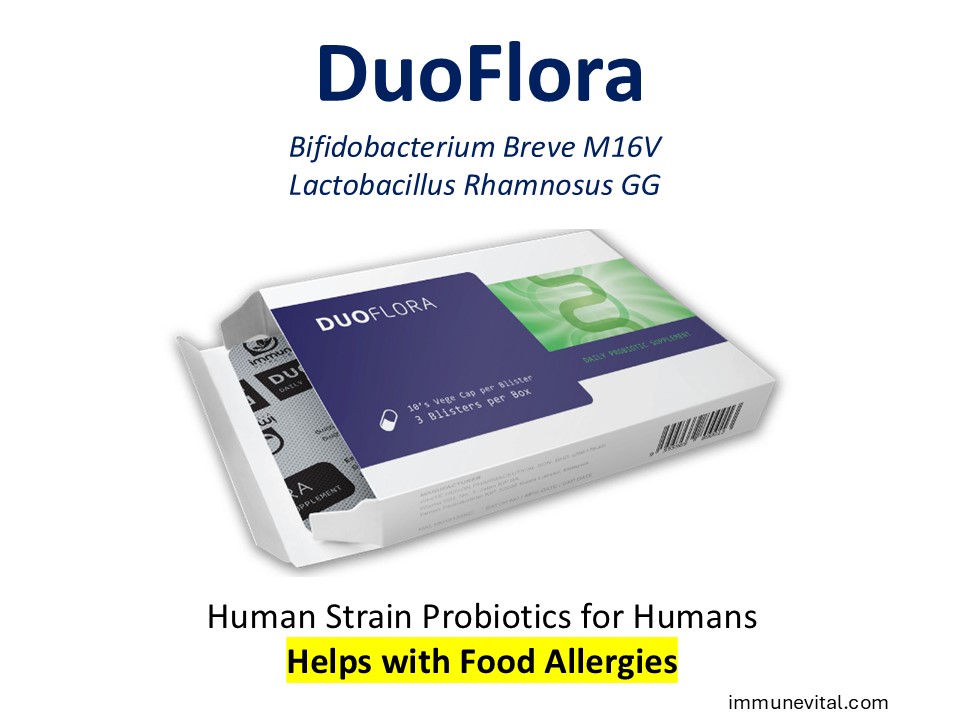
Duoflora combines two human-derived, clinically proven strains—Bifidobacterium breve M-16V and Lactobacillus rhamnosus GG (LGG)—designed specifically to colonize the human gut and guide your immune system toward tolerance.
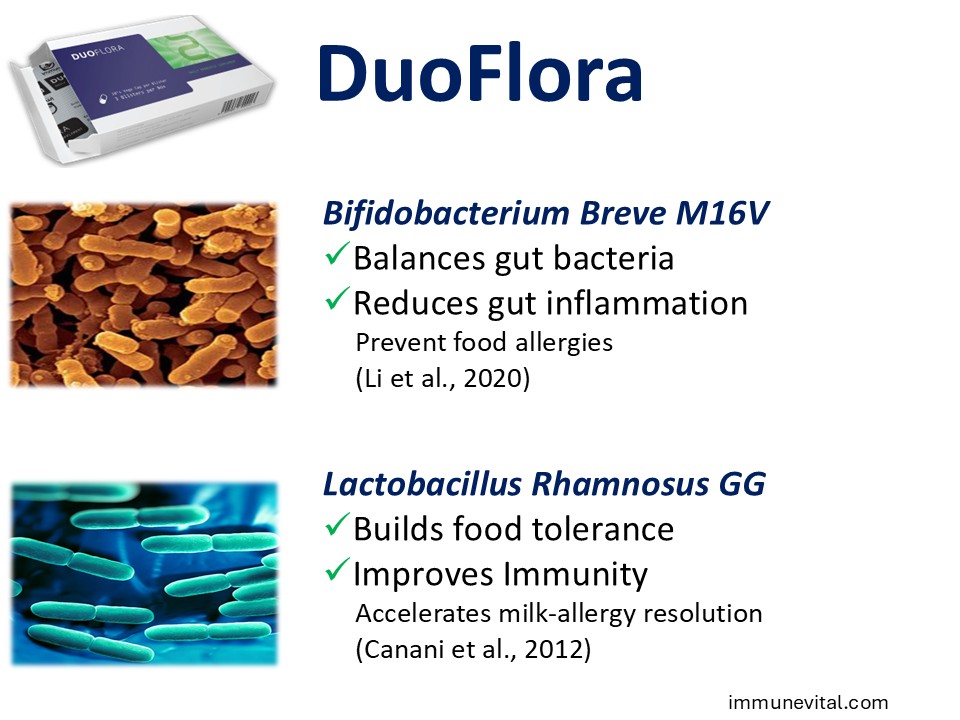
How Do the Strains Work?
Bifidobacterium breve M-16V: The Allergy Relief Expert
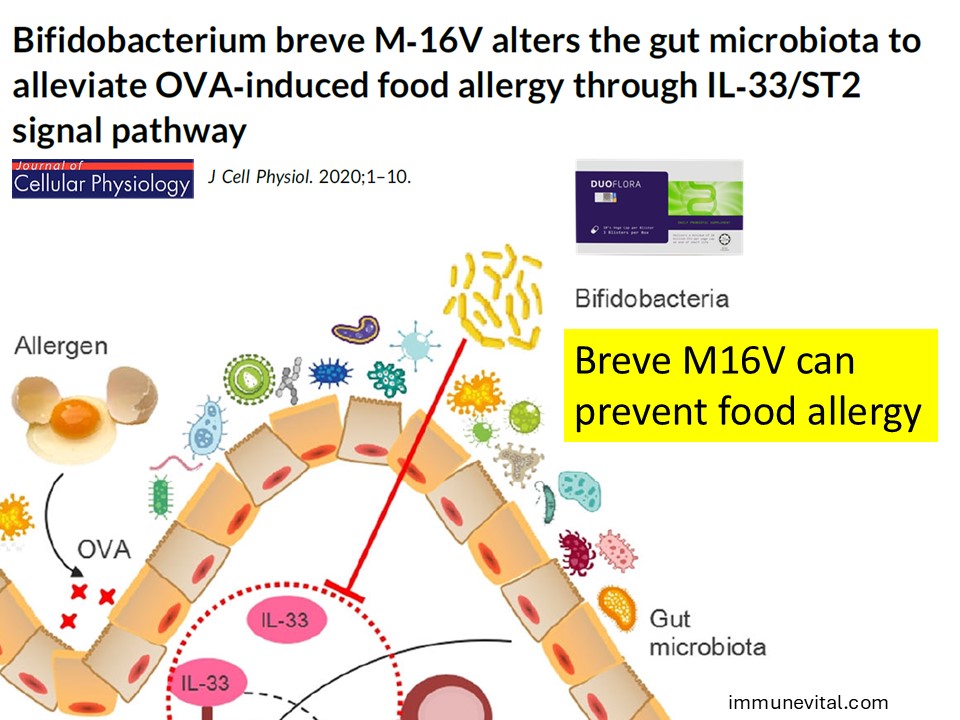
This strain helps restore balance to your gut microbiome, creating an environment less prone to triggering allergies. Research has shown its ability to alleviate food allergy symptoms by modulating immune responses.
Lactobacillus rhamnosus GG: The Food Tolerance Builder
Babies with severe milk allergies (FPIES)
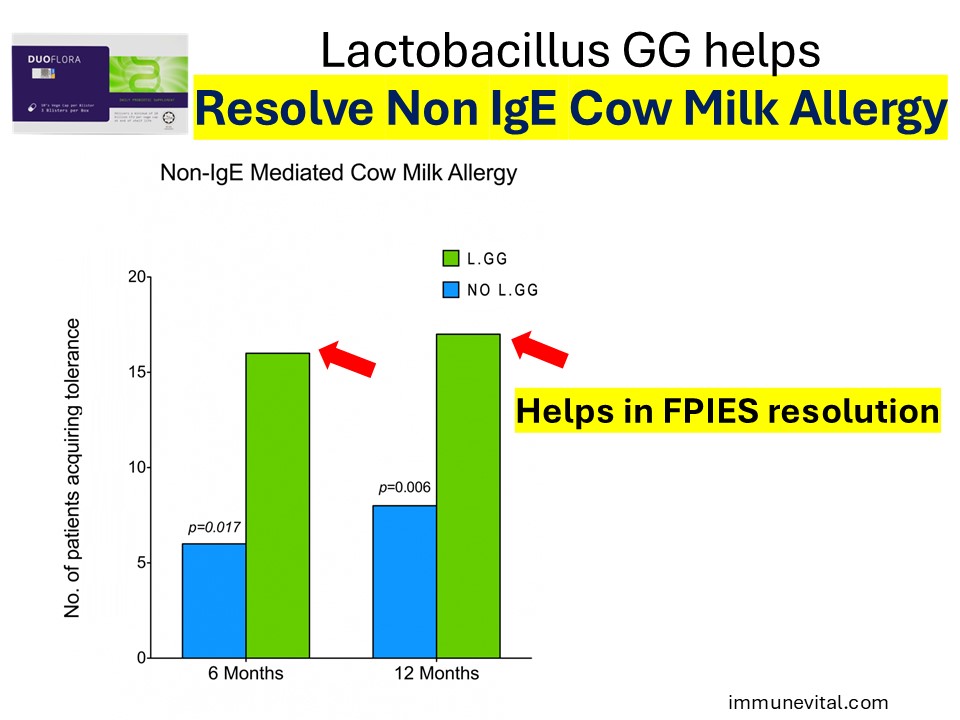
In a study with babies who had severe type of non IgE food allergy to cow’s milk called FPIES, adding Lactobacillus rhamnosus GG to their formula helped them develop tolerance to cow’s milk faster.
Children “outgrowing” milk allergies
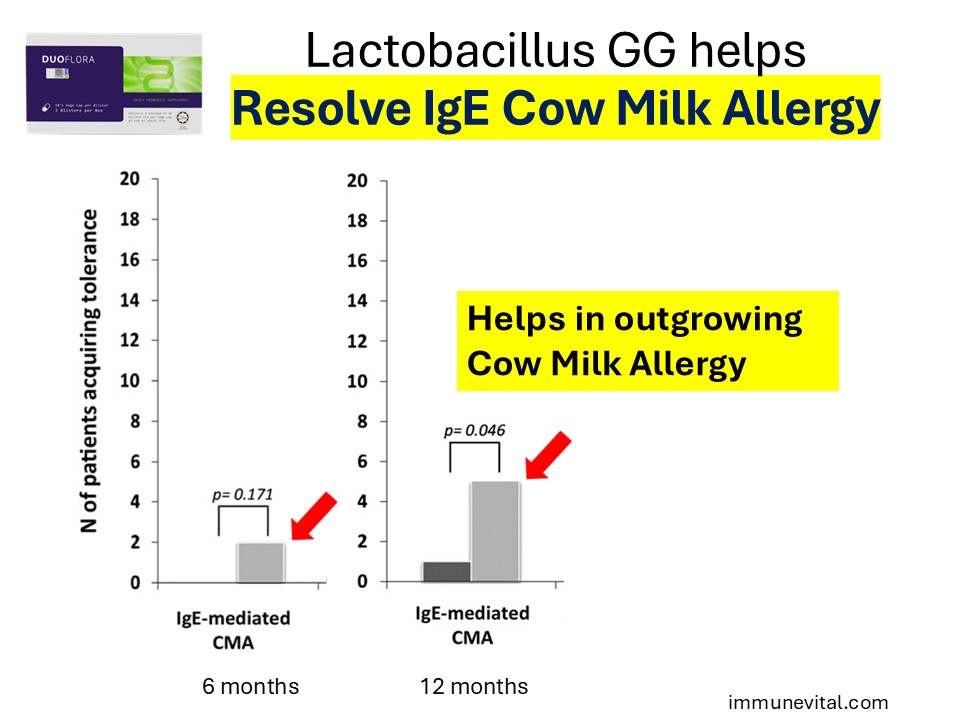
The same study also found that Lactobacillus rhamnosus GG helped children with IgE allergy to cow’s milk get rid of their allergy. Those who took LGG with a special milk formula showed better results and resolved their cow’s milk allergy.
Building food tolerance
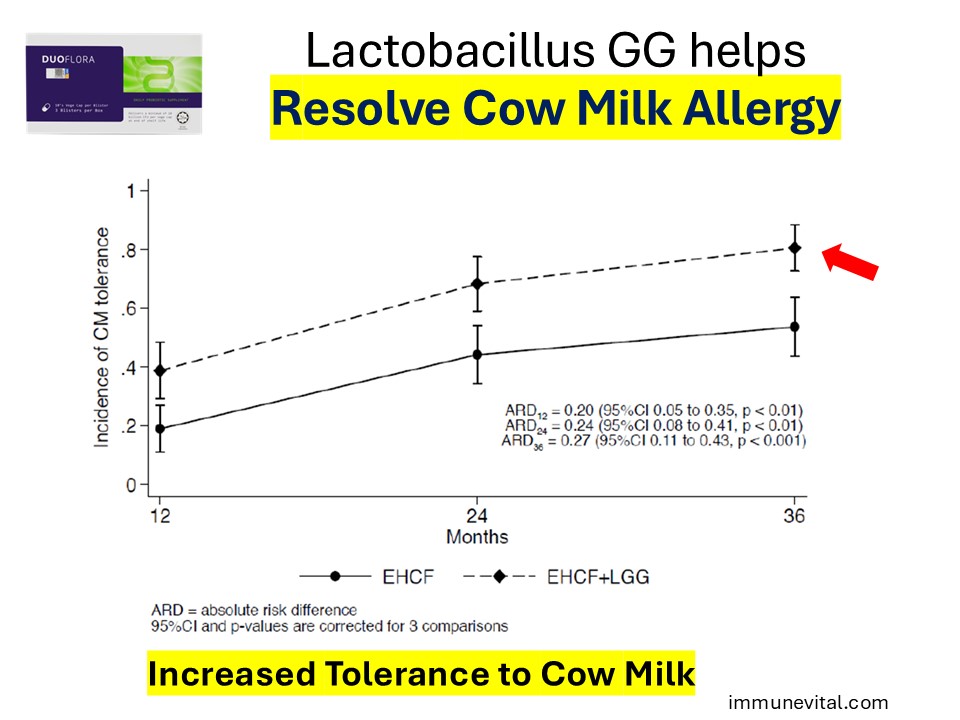
In another study, babies who received Lactobacillus rhamnosus GG with a special milk formula were more likely to outgrow their cow’s milk allergy. This shows that probiotics like LGG can help babies build tolerance to food allergens.
Why Duoflora Stands Apart
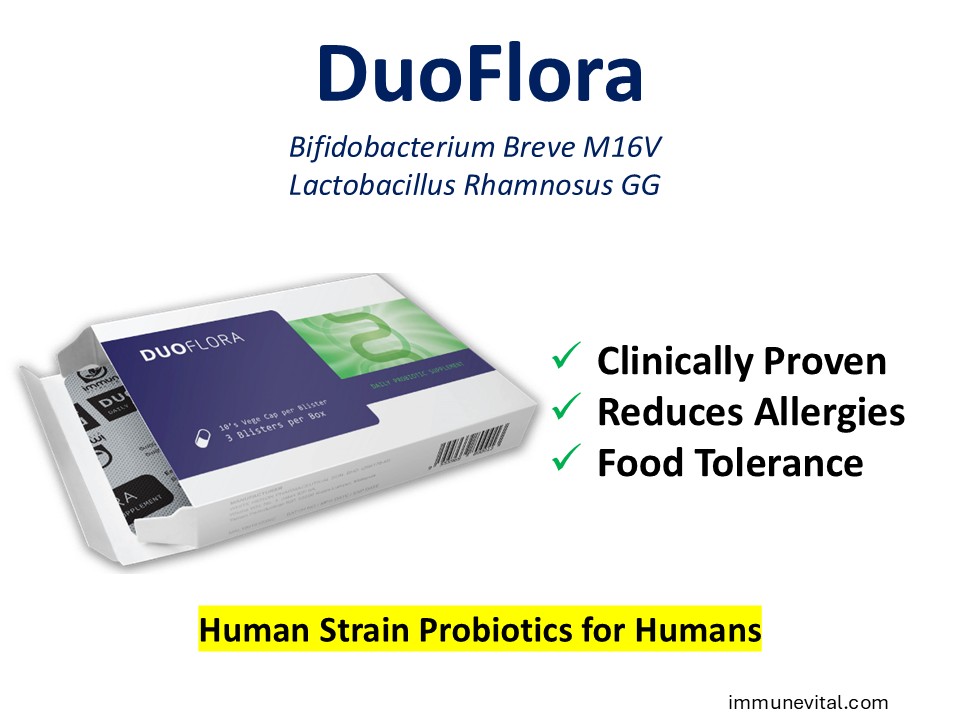
What sets Duoflora apart is its use of human-derived probiotic strains. Unlike generic probiotics, these strains are naturally adapted to thrive in the human gut, making them more effective in:
- Preventing food allergies
- Helping a person outgrow their food allergies.
- Helping the immune system develop food tolerance.
Support your gut and immune health today—try Duoflora and experience the difference!
What Our Customers Say About Duoflora

⭐ “A Game-Changer for My Son’s Food Allergies!”
“My 3-year-old had severe milk allergies, and every meal felt like a risk. Since starting Duoflora, he can tolerate milk in muffins and cakes. I feel more at ease knowing his allergy has a chance of getting better.”
— Faridah, Kuala Lumpur
⭐ “Finally, a Probiotic That Works!”
“I used to react badly to dairy and always felt bloated. After a few weeks on Duoflora, I noticed real improvements—less discomfort. It’s the only probiotic that’s made a difference for me.”
— Rajesh, Penang
⭐ “Peace of Mind for Our Family”
“My daughter has multiple food allergies, and we were always on edge. Since taking Duoflora, she’s outgrown some of her allergies, and we feel more confident introducing new foods. It’s now part of her daily routine!”
— Mei Chen, Singapore
3 Practical Tips for Living with Food Allergies
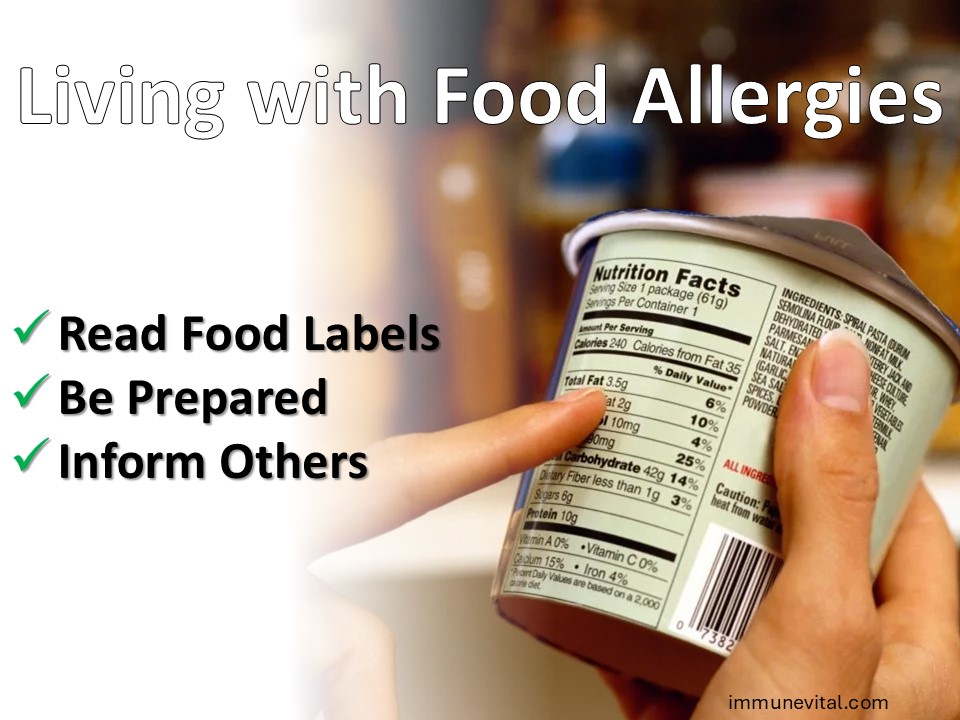
- Label-Check Every Time: Recipes change—always read new labels.
- Emergency-Ready: Keep antihistamines and an epinephrine auto-injector on hand.
- Speak Up: Inform servers, hosts, and friends about your allergy needs.
📌 [Click here to find out about: Food Immunotherapy as a treatment for Food Allergy]
FAQ
- Is Duoflora safe for children and babies?
Yes, it contains strains clinically proven to be safe and effective for all ages, including infants. - Can Duoflora cure food allergies?
Studies show that the probiotic strains in Duoflora can help support immune tolerance, increasing the chances of outgrowing food allergies over time. - How long does it take to see results?
Most people notice improvements in digestion and immunity within 4–8 weeks of consistent use. For food allergies, research suggests that long-term probiotic supplementation—at least one year or more—may be needed to support immune tolerance and increase the chances of outgrowing the allergy. - Can Duoflora replace allergy medications?
No, Duoflora is a complementary approach. Always follow your doctor’s advice and prescribed treatments. - Is Duoflora halal-certified?
Yes, Duoflora is halal-certified, making it suitable for Muslim families. - What makes Duoflora different from other probiotics?
Unlike generic probiotics, Duoflora uses human-derived strains that are naturally more effective at restoring gut balance and reducing inflammation.
Ready to Transform Your Family’s Allergy Journey?

✅ Protect against new allergies
✅ Calm overactive immune reactions
✅ Build lasting tolerance
👉 Order Duoflora Now and take control of food allergies—naturally and effectively!
References:
Li N, Yu Y, Chen X, Gao S, Zhang Q, Xu C. Bifidobacterium breve M-16V alters the gut microbiota to alleviate OVA-induced food allergy through IL-33/ST2 signal pathway. J Cell Physiol. 2020 Dec;235(12):9464-9473.
Canani RB et al. Effect of Lactobacillus GG on tolerance acquisition in infants with cow’s milk allergy- A randomized trial. J Allergy Clin Immunol 2012;129(2):580-582
Berni Canani R et al. Extensively hydrolyzed casein formula containing Lactobacillus rhamnosus GG reduces the occurrence of other allergic manifestations in children with cow’s milk allergy: 3-year randomized controlled trial. J Allergy Clin Immunol. 2017 Jun;139(6):1906-1913.e4.


